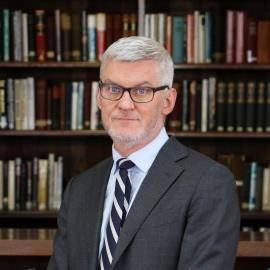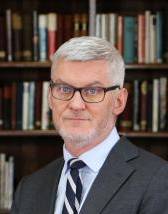RUSI Experts Comment on the Trump-Putin Summit
Read reactions from Director of Military Sciences Matthew Savill, Director of the Centre for Finance and Security Tom Keatinge and Director of International Security Neil Melvin on the meeting of President Trump and President Putin in Alaska.
If Putin’s military objective was to avoid immediate constraints on Russian operations in Ukraine, then he appears to have succeeded: the continued intensity of fighting reinforces the impression that the Russians are prioritising changing facts on the ground ahead of any ceasefire.
Matthew Savill
Director of Military Sciences
'Indeed, Putin may have successfully neutralised the idea of a ceasefire by hinting at a broader deal he knows will take time to negotiate. While we await specifics on what he offered, which have now been transmitted to Ukraine and its European partners, it seems unlikely that Russia will be prepared to take any significant steps. And though Russian progress on the ground is painfully slow, it still seems to be calculating it can outlast Ukraine and its international backers.
'Absent a credible threat of more painful sanctions and expanded military support to Ukraine, the Russians remain focused on grinding the Ukrainians down. For all the US military power on display in Alaska, Putin appears to have little fear it will be turned his way. Meanwhile, the European ‘Coalition of the Willing’ is stuck awaiting a ceasefire that it is insufficiently intimidating to promote its activation. Having made a European deployment conditional on US support, and begun briefing about a lowered set of ambitions, Europe now has a difficult decision to make on the level of risk it is willing to take when backing Ukraine. And Ukraine still needs to find answers to Russia’s military-industrial advantages.'
Comments by Matthew Savill, Director of Military Sciences
Trump remains bafflingly unwilling to apply the maximum economic pressure on Russia that would mean summits like those held yesterday are more likely to yield the success Donald Trump craves.
Tom Keatinge
Director, CFS
'For the self-styled master of the deal, the economic dimension of the summit is probably where Trump had the most to offer. The lead-up to the summit contained a range of contradictory signals mixing carrots (investment deals and sanctions relief) with sticks (heavier sanctions and more tariffs on Russia’s oil trading partners, notably India, to reduce Russia’s oil income).'
'Arriving with a 'business' team seemingly ready to discuss deals with Trump, Putin got none of the carrots he perhaps hoped for. Equally, from the little we have leaned from the leaders’ post-summit remarks and travelling teams’ comments, the threat of further economic pressure was not discussed. Thus the status quo remains. All eyes will now turn back to the impending imposition of 25% tariffs on India for its purchase of Russian oil.'
'In short, with Russia's economy on the ropes, Trump remains bafflingly unwilling to apply the maximum economic pressure on Russia that would mean summits like those held yesterday are more likely to yield the success Donald Trump craves.'
Comments by Tom Keatinge, Director of the Centre for Finance and Security
Vladimir Putin came to the Alaska summit with the principal goal of stalling any pressure on Russia to end the war. He will consider the summit outcome as mission accomplished.
Dr Neil Melvin
Director, International Security
'Russia's war aims have not changed since it launched its invasion of Ukraine in 2022. At the summit, Putin was clear that he wants to address first what he calls the root causes of the war. The Kremlin identifies these as NATO enlargement, the emergence of governments in Ukraine resistant to Russian integration projects, and challenges to Russian claims about territory and ethnic Russians in Ukraine. Precluding all these are Russia's preconditions and they underpin Putin’s demand for a 'comprehensive peace underpins Putin's demand for a 'comprehensive peace deal peace deal'. This agenda would lead to the subjugation of Ukraine.'
'Putin made no concessions at the summit. Moreover, he succeeded in presenting himself as a legitimate equal to the US president. He will also consider it a victory that he was able to marginalise Zelensky and European leaders from the central discussion about the future of European security.'
'The focus will now shift to a battle over the next steps. Much will depend on what Trump does. In the weeks preceding the summit, the US President appeared to grow frustrated by Russia's lack of substantial engagement in a meaningful peace process. Sensing growing resolve from the White House, Putin agreed to the summit to forestall Trump's threat of increased pressure on Russia, including the possibility of secondary sanctions.'
'Putin clearly seeks to pull the US into a protracted negotiation, with a particular prize being to get Trump to come to Moscow, as Putin indicated at the concluding summit press conference. Putin will look to further increase the pressure on Kyiv by continuing the Russia summer military offensive which in the past week has shown signs of gaining momentum in the Donbass region.'
'Trump clearly remains interested in brokering a peace deal, not least since this is the easiest path to a Nobel Peace Prize. Nevertheless, at the close of the summit he also seemed to suggest that it was now up to Ukraine and the Europeans to take the process forward. If Putin cannot bait Trump into a further round of bilateral strategic summits, he will be content if Trump grows tired of the whole thing and effectively walks away.'
'Zelensky, backed by the Europeans, will feel that the summit has avoided the worst outcome – a deal over their heads. Zelensky needs to prevent Putin luring Trump into a series of discussions on a broad economic and political agenda and gradually downgrading the Ukraine war in US-Russia bilateral relations. Zelensky has proposed the idea of a trilateral meeting to keep Trump engaged.'
'Zelensky will travel to Washington next week to press this idea. His key tasks on Monday in the Oval Office will be to shore up Trump’s resolve to remain engaged and to press him to increase pressure on Putin to make a meaningful and immediate commitment to the negotiating table through further sanctions and stepping up military support to Ukraine.'
Comments by Neil Melvin, Director of International Security
COMMENTS BY
Matthew Savill
Director of Military Sciences
Military Sciences
Tom Keatinge
Director, CFS
Centre for Finance and Security
Dr Neil Melvin
Director, International Security
International Security







